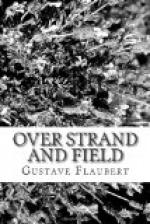The theatre was roofless and its walls were of grey canvas; they fluttered in the wind and would have blown down had it not been for the poles which held them. Along the sides of the ring was a railing, behind which was the audience, and in a reserved corner we perceived the two phenomena nibbling at a bundle of hay half concealed by a gorgeous blanket. In the middle of the ring a high post was sunk in the ground, and here and there, attached to smaller posts, were dogs, barking and tugging at their chains. The men continued to shout and beat the drum, the bears growled, and the crowd began to file in.
First they brought out a poor, half-paralyzed bear, which seemed considerably bored. It wore a muzzle and had a big collar with an iron chain around its neck, a rope in its nose, to make it obey commands promptly, and a sort of leather hood over its ears. They tied bruin to the centre post, and the barks grew louder and fiercer. The dogs stood up, a bristling, scratching crew, their hind-quarters elevated, their snouts near the ground, their legs spread, while their masters stood in opposite corners of the ring and yelled at them in order to increase their ferocity. They let three bull-dogs go and the brutes rushed at the bear, which began to dodge around the post. The dogs followed, crowding and barking; sometimes the bear would upset them and trample them with its huge paws, but they would immediately scramble to their feet and make a dash for its head, clinging to its neck so that it was unable to shake off their wriggling bodies. With watchful eye, the two masters waited the moment when it looked as if the bear would be strangled; then they rushed at the dogs, tore them away, pulled their necks and bit their tails to make them unlock their jaws. The brutes whined with pain, but they would not let go. The bear struggled to free itself from the dogs, the dogs bit the bear, and the men bit the dogs. One young bull-dog especially, was remarkable for its ferocity; it clung to the bear’s back and would not let go, though they chewed and bent its tail, and lacerated its ears. The men were compelled to get a mattock to loosen its jaws. When they had all been disentangled, everyone took a rest; the bear lay down on the ground, the gasping dogs hung their tongues out, and the perspiring men pulled the hairs from between their teeth, while the dust that had arisen during the fight scattered in the atmosphere and settled on the heads of the spectators.
Two more bears were led into the ring, and one acted the gardener of the fable, went on a hunting trip, waltzed, took off its hat, and played dead. After this performance came the donkey. But it defended itself well; its kicks sent the dogs flying through the air like balloons; with its tail between its legs and its ears back, it ran around the ring trying to get its foes under its forelegs while they endeavoured to run around it and fasten their teeth in its throat. When the men finally rescued it, it was completely winded and shaking with fright; it was covered with drops of blood which trickled down its legs (on which repeated wounds had left scars), and, mingling with sweat, moistened its worn hoofs.




